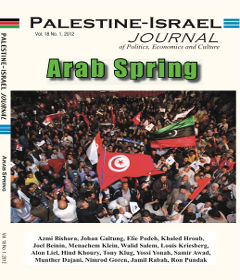Though many people may not agree on the name "Arab Spring," we
decided to call this issue of the Palestine-Israel
Journal "The Arab Spring," and put together local and
international contributions from prominent academics, public
figures and writers to discuss the various aspects of this
phenomenon. Is it spring or revolution? Will its events and
repercussions continue for a long time to come? Was it a regional
event, or was its impact both regional and global? Did it succeed
in bringing the needed change which people fought for, or did it
just change the personnel while the same regimes remained in power?
What will be the future of the Arab countries that were able to go
to the polls and carry out free democratic elections? Will the
Islamic movement that won the majority in several Arab countries be
able to adopt democratic values and share responsibility with the
others, or will it see the elections as a one-time exercise that
brought it to power and forever?
read more ...
